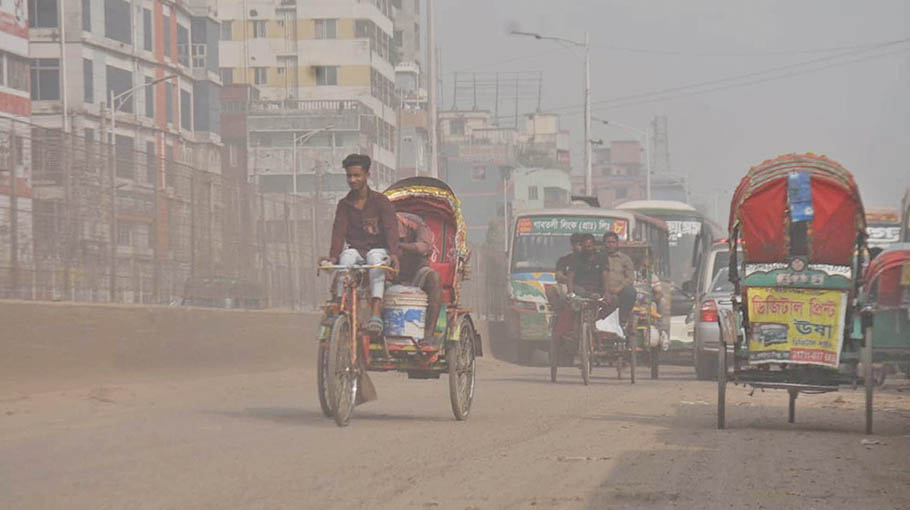Dhaka’s air quality turns ‘very unhealthy’


The capital Dhaka has ranked the third on the list of cities with the worst air quality with an AQI score of 226 on Friday morning.
On Friday’s air was classified as 'very unhealthy’ and an unhealthy air quality continued for the past few days, according to the AQI index.
When the AQI value for particle pollution is between 50 and 100, air quality is considered ‘moderate’, usually sensitive individuals should consider limiting prolonged outdoor exertion, between 101 and 150, air quality is considered ‘unhealthy for sensitive groups’, between 150 and 200 is ‘unhealthy’, between 201 and 300 is said to be 'very unhealthy', while a reading of 301+ is considered 'hazardous', posing serious health risks to residents.
Pakistan’s Lahore, India’s Delhi and Kolkata occupied the first, second and fourth spots in the list, with AQI scores of 718, 602 and 174 respectively.
The AQI, an index for reporting daily air quality, informs people how clean or polluted the air of a certain city is and what associated health effects might be a concern for them.
The AQI in Bangladesh is based on five pollutants: particulate matter (PM10 and PM2.5), NO2, CO, SO2, and ozone.
Dhaka has long been grappling with air pollution issues. Its air quality usually turns unhealthy in winter and improves during the monsoon.
This is in fact nothing new for the dwellers living in capital Dhaka and its adjacent cities that they start experiencing terrible dust pollution when winter approaches every year.
The dust pollution turns acute in the capital Dhaka, Gazipur and Narayanganj cities during the dry season, which is over three times higher than the permissible level.
As winter creeps in, the pollution level in the capital has already started reaching its extreme level due to uncontrolled discharge of dust from construction works and road digging, posing serious health risks to the city dwellers.
Road dust becomes the biggest source of pollution in the capital, especially during the dry season for various reasons, including unplanned construction works, rundown roads and many other sources.
Earlier, the High Court criticised the authorities concerned of the government for their failure in taking effective measures to control air pollution in Dhaka and surrounding areas despite its repeated directives.
But, the Department of Environment (DoE), Dhaka North City Corporation, Dhaka South City Corporation, Gazipur City Corporation and Narayanganj City Corporation have not taken any effective steps to reduce air pollution yet.
The city corporations are well known that dust pollution intensifies every year during winter, but they have no preparedness and action plans to deal with the terrible situation.
Apart from the city corporations, the DoE responsible for taking a proper plan to check dust pollution in the city is also reluctant in this regard.
Air pollution also still remains one of the top most challenges for the country’s major cities.
Air pollution consistently ranks among the top risk factors for death and disability worldwide.
Breathing polluted air has long been recognised as increasing a person’s chances of developing heart disease, chronic respiratory diseases, lung infections and cancer, various studies say.
As per the World Health Organisation, air pollution kills an estimated seven million people worldwide every year, largely as a result of increased mortality from stroke, heart disease, chronic obstructive pulmonary disease, lung cancer and acute respiratory infections.
But, the dust pollution is on the rise for lack of good governance, preventive measures, action plans, initiatives and enforcement of law.
“The authorities concerned must spray water on major roads in the capital Dhaka and two other metropolitan cities to control the dust immediately,” a passerby told this correspondent on Friday.
Talking to this correspondent commuters said in this regard, DoE and city corporations should hold meetings with relevant departments and agencies to reduce dust pollution with coordinated efforts immediately.
“Besides, relevant laws should be enforced strictly to force the builders and constructors to build roads and buildings following rules and regulations like covering construction sites and spraying water to control dust,” Abdur Razzak, principal of a girls school and college said .
Otherwise, the city dwellers will have to suffer a lot and brace for terrible “dust pollution if proper steps are not taken to deal with it as early as possible,” he added.



